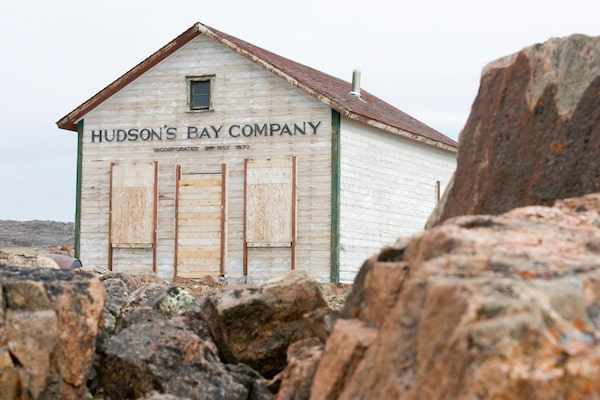
Fort Ross, the location for a Hudson's Bay Company trading post at the mouth of Bellot Strait, NU in the Northwest Passage in the Arctic Circle.JONATHAN HAYWARD/The Canadian Press
When the broadest index of Canada’s biggest stocks changes its membership next month, there may no longer be room for Canada’s oldest company.
Three emerging cannabis sellers may join the club, however.
The S&P/TSX Composite Index is poised to do a “reconstitution,” a process it does every quarter to remove companies that have become too small and add companies that have grown in value. And Hudson’s Bay Co., thanks to its shrinking share price, is now small enough to lose its spot.
S&P won’t announce its decisions until early March, and the firm’s index committee has some discretion in making the changes. But HBC is among the companies flagged by Chris Murray, the managing director of institutional research at AltaCorp Capital, in a recent study of potential additions and deletions to the index.
Potential new composite members include pot stocks HEXO Corp., CannTrust Holdings Inc. and the Green Organic Dutchman Holdings Ltd., which would double the number of cannabis companies in the 239-member composite. (Canopy Growth Corp., Aurora Cannabis Inc. and Aphria Inc. are already members.)
With the growth of index funds and other passive investing strategies, whether a stock is in or out of a major index can have a meaningful impact on share prices, Mr. Murray said, because many fund managers who track an index need to hold shares in the companies. “Index inclusion has been an important factor in total return for stocks in the last decade," he said.
That’s more bad news for HBC, which has seen its value erode as investors have lost faith in the company’s turnaround. The company, founded in 1670, struggled over the past several decades with heavy debt and changing shopping habits. Current chairman Richard Baker acquired it in 2008 and sold shares to the public in 2012.
Mr. Baker’s plan has been to combine Hudson’s Bay with several other department-store chains and take advantage of the underlying real estate. A combination of successful property sales and optimism about the retail sector saw the shares peak above $21 in 2013, but the company’s underwhelming results and investor fears about retail in general have driven the shares down to the single digits, bottoming out at $6.80 in December. They closed at $8.11 on Tuesday.
The company did not reply to a request for comment for this story. Late Tuesday, it said president Alison Coville is stepping down, effective Friday, and the company will look for a permanent successor.
HBC still has a market capitalization – common shares outstanding times share price – of about $1.5-billion. But that’s not how S&P and many other index creators select membership. Instead, they look at the value of shares that aren’t held by insiders and therefore trade frequently and are easily available to the public. This is called the “float.”
With Mr. Baker holding almost 12 million shares, and other major investors and hedge funds holding huge blocks, only about a third of HBC’s 235 million shares are in the float. So the company’s “float-adjusted market capitalization” is just more than $500-million, Mr. Murray calculates.
To stay in the composite, a company’s float-adjusted market capitalization must be 0.025 per cent, or 2.5 hundredths of a percentage point, of the total value of the index. Mr. Murray says recent HBC trades put it below the threshold.
While the potential departure of HBC and the addition of the cannabis companies represent a symbolic changing of the guard, S&P quietly made an important methodology change that could expand membership in the composite over time. Until this quarter, a company’s float-adjusted market capitalization needed to be at least 0.05 per cent, or five hundredths of a percentage point. Starting in March, the new minimum is 0.04 per cent, or four hundredths of a percentage point, effectively cutting the minimum size of float-adjusted market cap for inclusion by more than $200-million, to just more than $900-million.
 David Milstead
David Milstead